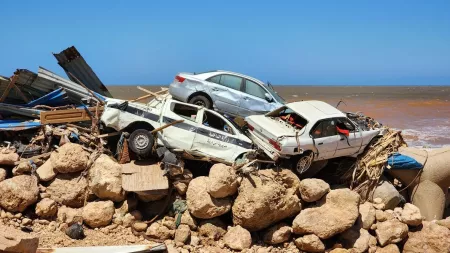One year ago, on the night of September 10-11, 2023, two dams in eastern Libya burst after heavy rainfall and flooded the area around the coastal town of Darna. 40,000 people lost their homes. Thousands lost their lives and over 8,000 people are still missing. The traces of the devastation are still visible today, reconstruction is difficult and the psychological wounds are far from healed.
“20,000 people have suffered trauma as a result of the flood disaster. Many children are still afraid of water."Mohamed Elasibai, Deputy Country Director, CARE Libya
“20,000 people have suffered trauma as a result of the flood disaster. Many children are afraid of water as a reaction. The education system is also fragile. Schools are still destroyed or under reconstruction. Teachers are still missing, others have left the city,” says Mohamed Elasibai Deputy Country Director, CARE Libya.
One year later, restoring normality remains a major challenge. The financial need is huge: The UN has received 45.4 million USD so far to fund the collective response to the floods in 2024, but the ongoing needs of communities in Libya are far from the international spotlight and risks developing into a forgotten crisis.
"The past years have been incredibly challenging, with the aftermath of war leaving us struggling to rebuild. Just as we began to find our footing, storm Daniel struck."Mohammed Hasan, Emergency Response Coordinator, CARE Libya
“As a staff member of the CARE Libya team, I have witnessed how resilient our community is. The past years have been incredibly challenging, with the aftermath of war leaving us struggling to rebuild. Just as we began to find our footing, storm Daniel struck, devastating our region and one of its well-known cities. Despite these hardships, I am proud to have been part of the team responsible for supporting affected families. Our community is starting to rise above these challenges, and we will continue to be part of it with all we can.” says Mohammed Hasan, Emergency Response Coordinator, CARE Libya
CARE is still on the ground and is particularly committed to helping affected women and girls together with national partner organizations like PULSE and the Libyan Red Crescent.
For media inquiries, contact: [email protected]
